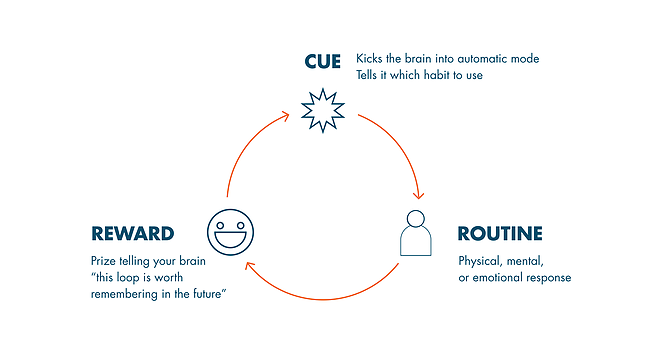Building habits is essential to achieving long-term goals, personal growth, and spiritual discipline. As Muslims, habit-building is also intertwined with our faith, encouraging us to strive for consistency in worship, self-care, and community. From the science of habit formation to practical tips for integrating habits into your spiritual and daily life, this comprehensive guide dives into everything you need to know about habit-building from both a psychological and Islamic perspective.
The Science of Habit Formation 🔬
Habit formation isn’t just about willpower; it’s rooted in the brain’s neurobiology. Psychologists and neuroscientists describe a 'habit loop' which is essentially a cycle of cues, routines, and rewards that reinforces behavior.
- Cue: A trigger that initiates the behavior. For example, leaving your Quran on the nightstand is the cue to memorize a verse or two.
- Routine: The behavior itself. In this case, it would be actively memorizing.
- Reward: The benefit received from the behavior. The satisfaction and fulfillment after successfully memorizing your portion serve as the reward, reinforcing the habit.

As habits become ingrained, brain activity shifts from the prefrontal cortex (responsible for decision-making) to the basal ganglia, an area associated with automatic behaviors. This means that over time, habits become less conscious and more automatic, conserving brain energy and helping us perform daily actions with less effort.

Key Studies on Habit Formation 📚
Psychological studies highlight the time and effort involved in habit formation:
- Lally et al. Study (2009): This study revealed that the average time to form a habit is around 66 days, though it varies widely depending on complexity. For instance, simpler habits like drinking water were established quicker than more involved ones, such as exercising.
- UCL Energy Balance and Cancer Study: Participants chose simple health habits to repeat daily. They found that habits strengthen over time, even if participants missed some days. Importantly, simpler actions became habitual faster than complex routines.
These studies remind us that patience and consistency are key. Simple actions are generally easier to maintain and strengthen over time, making them ideal starting points for anyone looking to form new habits.
An Islamic Perspective on Habits 🌙
Islam emphasizes the importance of consistency in actions, even if they are small. The Prophet Muhammad ﷺ said, “The most beloved of deeds to Allah are those that are consistent, even if they are small.” This hadith encourages us to prioritize regular, sustainable actions over sporadic grand gestures.
Another principle in Islam is niyyah, or intention. Actions are judged by the intention behind them, making it crucial to start any habit with a clear purpose. For example, praying or giving charity regularly with the intention of drawing closer to Allah transforms these acts into powerful, rewarding habits.

Principles of Effective Habit-Building 📝
Here are key principles supported by both psychology and Islamic teachings for building lasting habits:
- Consistency: Repeat the behavior regularly in a specific context. The Prophet’s PBUH emphasis on consistent actions, no matter how small, aligns with the psychological findings on habit formation.
- Context-Dependence: Choose specific cues or contexts to trigger the behavior. Associating a habit with certain times or places, like reading Quran after each Fajr, makes it easier to perform consistently.
- Simplicity: Start with manageable actions. Setting goals that are too complex can lead to burnout. Instead, break down larger goals into smaller steps, like memorizing one verse of the Quran daily instead of an entire surah at once.
- Patience: Habits take time. Studies show that forming a habit can take anywhere from 18 to 254 days. If you miss a day, don’t give up; instead, refocus and continue.
Practical Applications in Daily Life 💭
Let’s apply these principles to habits that many Muslims may wish to build:
Spiritual Habits
- Daily Quran Recitation: Set aside five minutes after Fajr or another prayer as a cue to read even a single page or verse. As this becomes routine, you may find yourself naturally increasing the time.
- Dua and Dhikr: Make supplication or remembrance of Allah a habit by pairing it with specific actions, like saying Alhamdulillah after meals or remembering Allah while walking. Habit stacking—linking new habits to established routines—makes it easier to establish consistency.
- Voluntary Fasting: For those wanting to build a fasting habit outside of Ramadan, start with one day a month, such as a Monday or Thursday, and work up from there.
Health and Well-Being Habits
- Exercise: Place workout clothes by your bed as an environmental cue for morning exercise. Make it a habit by committing to just a few minutes a day initially.
- Healthy Eating: Store healthy snacks where you can easily access them. Remove temptations, like keeping junk food out of reach, to make it easier to choose healthier options.
- Hydration: Drink a glass of water first thing in the morning by keeping a bottle on your bedside table. Over time, this small action can build into a hydration habit.
Strategies for Success 📈
Habit-building can be strengthened by specific strategies that make desired behaviors easier and undesired ones harder.
- Habit Stacking: Link new habits to existing ones. For instance, if you already pray five times a day, stack a quick dua or Quran recitation immediately afterward.
- Environmental Design: Arrange your environment to support your goals. If you want to memorize Quran, keep a small, accessible mushaf at your desk or set up a quiet corner for prayer and recitation. Check out our blog on how to create the PERFECT environment for memorization for more tips on creating a Hifz haven 👇

- Simplicity: Break complex habits into smaller steps. For example, instead of aiming to finish the Quran in a month, commit to one page per day and gradually build on that. More tips on building a Quran habit can be found here! 👇

Challenges in Habit Formation and How to Overcome Them 💪
The journey to building habits isn’t always smooth. Here’s how to tackle common challenges:
- Motivation Declines: Initial motivation is often high, but it can fade. This is where consistency and setting smaller, manageable goals come in.
- Competing Habits: Existing habits can interfere with new ones. Replace an unproductive habit with a productive one instead. For example, replace late-night screen time with a short prayer or Quran reading.
- Persistence of Old Habits: Old habits are never fully erased; instead, they can be replaced. Each time you choose the new habit over the old one, you reinforce the new behavior.
Reducing Friction and Making Habits Stick 🌊
Minimizing barriers can make habit-building smoother. Here are ways to reduce friction for desired habits and increase it for undesired ones:
- Preparation and Planning: Lay out clothes for Tahajjud prayer or prepare healthy snacks in advance. The fewer obstacles you face, the easier the habit becomes.
- Technology Utilization: Use habit-tracking apps, set reminders, or employ website blockers to avoid distractions.
- Friction for Undesired Habits: Make unwanted behaviors harder. For instance, limit social media by using screen time apps or move the TV remote out of reach.

Islamic Teachings and Habitual Worship 🕌
In Islam, consistent worship and habits are highly encouraged. The Prophet Muhammad ﷺ consistently woke up for Tahajjud, engaged in dhikr, and recited Quran, setting an example of disciplined, intentional worship. These habits illustrate the importance of prioritizing and regularly engaging in acts that draw us closer to Allah.
Quranic Verse on Perseverance: Allah says in the Quran, “And those who strive for Us—We will surely guide them to Our ways” (Quran 29:69). This verse encourages us to remain steadfast and seek Allah’s guidance, knowing that each small step we take toward consistency and devotion will be rewarded.

Embracing Patience and Progress 🤲
Building habits as a Muslim isn’t just about personal growth; it’s a spiritual journey. By combining psychological principles with Islamic teachings, we can develop habits that align with our values and bring us closer to Allah. Remember, habit-building is a gradual process that requires patience, resilience, and, most importantly, intention.
Start small, stay consistent, and let each habit bring you closer to the person you strive to become. Just like Rome wasn’t built in a day, neither are habits—so give yourself time, and remember that every effort counts in the eyes of Allah.






